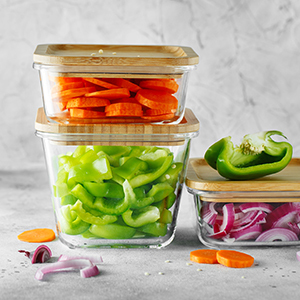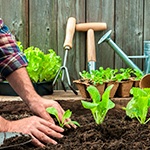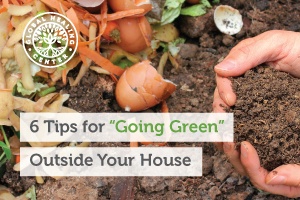
In my previous blog post, Going Green Inside Your Home, we've seen what we can do inside the house to make a difference on the environment — from saving water to recycling to reducing electricity use. Now let's see what we can do on the outside.
Best Ways to "Go Green" Outside Your Home
If you have kids or a green thumb, some of these are going to be a lot of fun.
1. Composting
Composting is one of the easiest and greenest ways to help out the environment. A compost bin doesn't cost too much, or you could even build your own! A bin is not necessary when a nice heap will do fine.
Pretty much anything will go into a compost pile, from your lawn clippings to raked up leaves to last night's dinner. Avoid meat and animal products in a compost pile, though. If you like to drink coffee, add your used coffee grounds to your compost pile to increase its overall nitrogen balance.
Not only does compost keep garbage scraps out of everyday waste, but it also creates nutritious food for your garden. Wait for your compost to degrade, and then you have some healthy fertilizer when you plant your new veggie garden.
2. Start a Vegetable Garden
If you have a compost pile, you should also have a veggie garden — the circle of nature is just beautiful. Imagine growing your own food, right outside your kitchen window! You'll never forget those last-minute herbs or vegetables you need for dinner.
And when all is said and done, all of your scraps go out into the compost bin, to one day help grow more vegetables.
Starting a garden isn't just something for those with a huge backyard either. Anyone can grow their own vegetables, whether you have a backyard or not. Container gardening is a great way to grow vegetables if you don't have enough yard space. Everything from tomatoes to lettuce to peppers and herbs can grow in a container garden. If you have more space, expand from there.
3. Worms
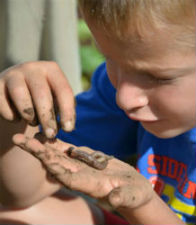
Composting may not be a lot of fun, and neither may planting your tomatoes or weeding the garden, but worms are always a big hit, especially with children.
You can buy yourself a small bin of dirt filled with worms, till your garden, add the worms, and after a while, you get more worms. Check with your local gardening store to see if they have worms for sale.
This way you're getting nice healthy dirt without the use of chemical fertilizers. When your compost is ready, add to the dirt to create more nutrition for your plants. The worms like it, too!
Gardening Tip — You can always tell it's healthy dirt if there are worms living in it.
4. Saving Water
There are so many ways to save water outside that I just had to mention it.
You can use buckets in the shower to massive tanks outside your house to capture rainwater. The latter is a more expensive option than the buckets, and tanks range anywhere from $75 up to several thousand.
But installing a water tank that can catch rainwater — most normally harvested from your roof and guttering — is a great way to help the environment.
From the tank, you can connect up a hose and water your garden whenever you want, especially handy if your region is affected by drought and, subsequently, water restrictions.
5. Plant a Tree
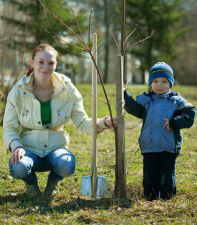
Across many nations, there are regular events to plant trees. With the massive deforestation taking place globally, as well as wildfires, every tree replaced is an improvement.
If you've got the room, make sure that you ask an expert about the type of tree you wish to plant. You don't want to plant an invasive species or plant it too close to your house so that its roots affect your foundation. Also, trees native to your region will survive better with less need of water.
I recommend planting trees that will produce fruit and grow well in your area. Do a bit of research.
6. Grow & Maintain Green Grass
I view going green as an activity for the whole family. Another one of the family-oriented ideas has to do with your lawn. If you are a parent with young kids, then you're going to love having them playing outside. And by choosing the right type of lawn for them to roll around on, you can save the environment some harm and keep them healthy, as well.
Once again, looking for advice is going to be your best bet. Head to your local nursery and ask for the type of grass that grows well in your location and requires minimal watering.
Often these are going to be native grasses, but there are also some special grasses designed to thrive with very little water. These of course do well in drought-stricken regions but are also going to be useful in reducing the watering you'll need to do. You might want to have your kids checked for any possible allergies to different grasses before planting. Be sure not to use chemical-based weed killers or fertilizers.
Another thing you can do for your lawn and the environment is to use a reel mower. Sure, it's going to take a bit of extra work on your part, but it is satisfying work.
And when you're done mowing — hopefully with the help of your kids — you'll be able to throw the clippings into your compost bin without any of the contaminants picked up going through a petrol-powered mower (you can also use an electric mower if your back isn't up for the reel mower).
Saving Money & Saving the Environment
Those are just some quick and easy tips to help you go green outside your house. They are helpful to you in that they help you save money, they save the environment, they keep you healthier, and they are infinitely rewarding.
There is nothing quite like growing your own food outside. And once again I'll stress the importance of getting your kids in on all of this. The earlier they learn that being green is a good idea, the sooner they'll make it a part of their lives.
†Results may vary. Information and statements made are for education purposes and are not intended to replace the advice of your doctor. If you have a severe medical condition or health concern, see your physician.


